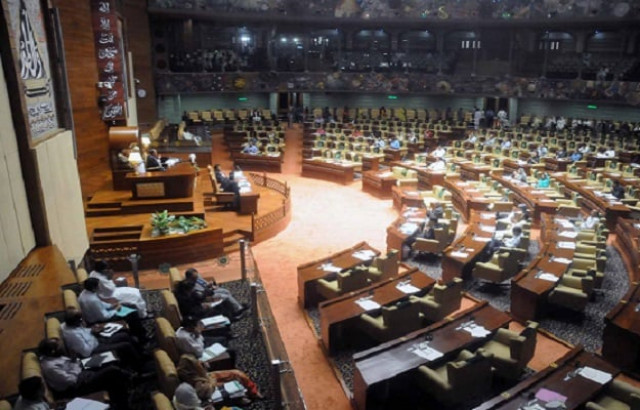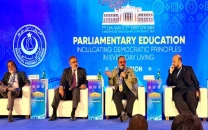Sindh govt fails on implementation front
Some Acts of the provincial assembly have not been enacted in letter and spirit for nearly a decade

Just like in the past few years or in some cases the past decade, implementation of laws passed in the Sindh Assembly this year remained non-existent, putting a question mark on the priorities of the provincial government.
Around 16 bills were passed during 2022, as per the provincial assembly's records; but they are either facing technical and administrative hindrances or their rules are yet to be finalised. Various members of the assembly are of the view that the laws passed during this year and previous years were only meant for show.
Bilal Ahmed Ghaffar, Parliamentary Leader for the Pakistan Tehreek-e-Insaf (PTI) in the Sindh Assembly, is one such member. "We passed a bill regarding the revival of student unions, which have been banned since 1984. Despite all members voting in favour of this law, its implementation has been non-existent, much to the dismay of students," he informed. However, this is not the only bill that is stuck in limbo, other bills regarding child marriages, home based workers, right to free education, protection of journalists, and control of narcotics are similarly stuck, as per Ghaffar. The Member Provincial Assembly (MPA) was of the view that the Sindh Assembly has set a consistent precedent for passing laws to show that they are working but all of that work is merely on paper. "What good are laws without effective implementation?" questioned Ghaffar.
Mohammad Hussain of the Muttahida Qaumi Movement (MQM), who was the MPA for Korangi, had a similar bone to pick with the government. "Our primary responsibility is to make laws but there is no point in making them if the government fails to implement them," remarked Hussain, adding that this leads to people becoming disenfranchised from the political process.
Hussain informed that in this regard he had moved a privilege motion in the assembly, back when he was a member, questioning the government and its bureaucracy's lacklustre attitude towards implementing laws. "After which, the government ministers assured us that laws would be implemented in letter and spirit, but to no avail."
Ghaffar and Hussain's claims hold weight as about 9 years ago a bill for the free and compulsory education of all children in the province aged 5 to 16, was passed, however, there has been no progress on it so far, as per sources privy with the matter.
Similarly, following the upsurge in child abuse, the Sindh Child Protection Authority Act was passed in 2011, but the authority remains dysfunctional in many districts of the province to date, according to Kashif Bajeer, a child rights activist. In this regard, Bajeer informed that the government allocates more than Rs 200 million to the authority every year but violence against children has remained at an all time high. "As per a report about 885 children were sexually abused in Sindh in 2021. We have pointed this out to the provincial government and asked them to appoint child protection officers, which is a mandatory provision under the law, but our requests have fallen on deaf ears," said Bajeer.
MPA for the current ruling party, Pakistan People's Party, Shamim Mumtaz, who heads the Sindh Child Protection Authority, when asked about the lack of implementation of the child protection law, replied: "I agree that there are some issues in a few places which will be resolved after we establish child protection units."
Apart from the bills that Ghaffar, Hussain, and Bajeer pointed out, laws like Right to Information Act (RTI), Sindh Protection of Human Rights Bill, Sindh Minimum Wage, Sindh Workers Welfare Fund, Sindh Witness Protection Act, and Environmental Protection Act, have not been implemented properly either. In this regard, the Express Tribune repeatedly reached out to the provincial Minister for Parliamentary Affairs and provincial Minister for Information, to get a timeline on the implementation of various laws stuck in limbo but did not hear back from them.
Published in The Express Tribune, December 27th, 2022.



















COMMENTS
Comments are moderated and generally will be posted if they are on-topic and not abusive.
For more information, please see our Comments FAQ